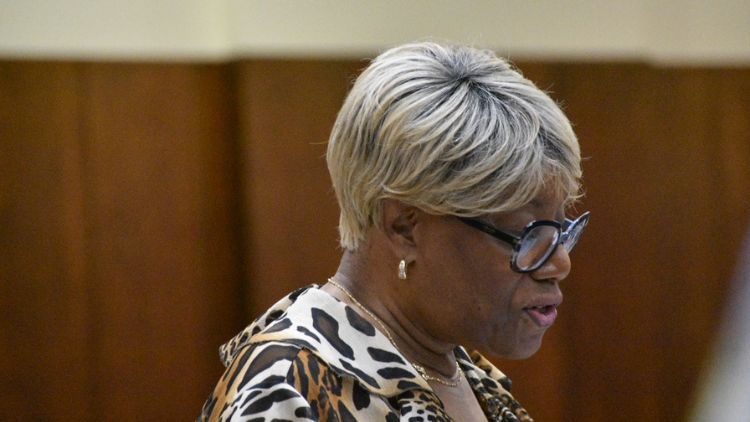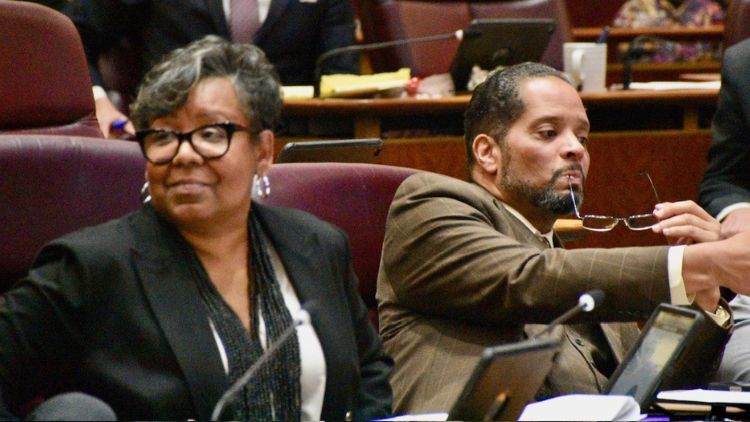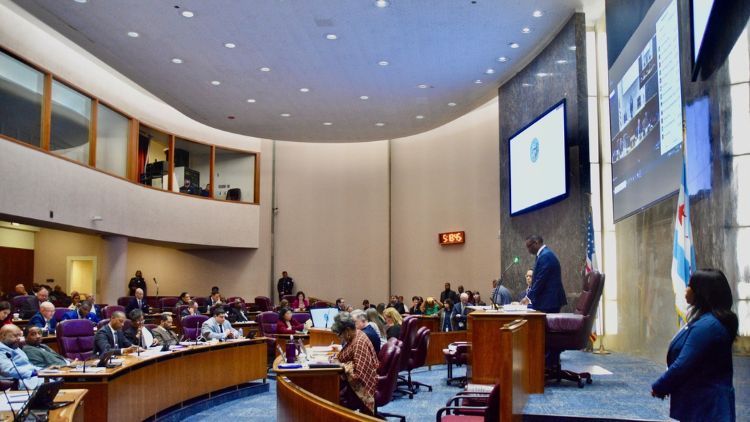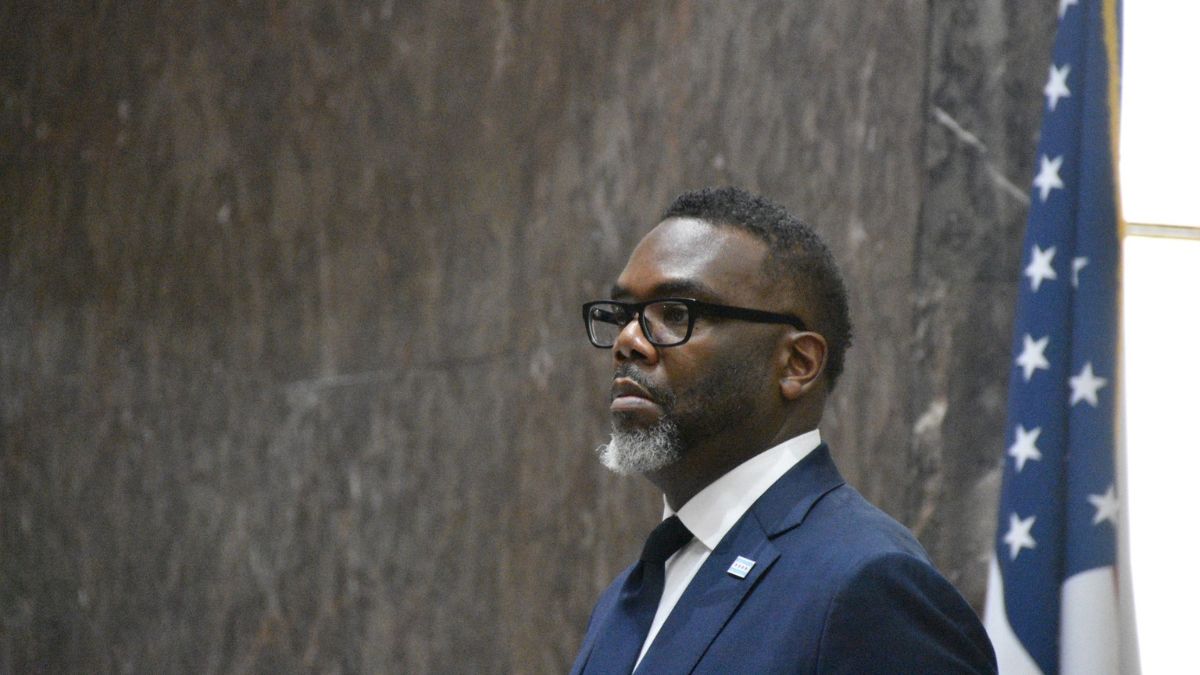Chicago City Council approves Mayor Johnson’s $17 billion spending plan with investments in youth jobs and community safety amid lingering fiscal challenges (Photo Credit: Lanette Warbington).
With Chicago’s City Council narrowly approving Mayor Brandon Johnson’s $17 billion spending plan Monday, voting 27-23 weeks before the year-end deadline, the budget avoids property tax hikes, job cuts or reductions in city services. But on Monday, after that vote, aldermen and observers noted that substantial challenges remain.
“I want to thank every single alderperson who worked with my administration to get this budget over the finish line,” Johnson said after the vote.

Ald. Pat Dowell (3rd) (Photo Credit: Lanette Warbington).
The budget’s approval occurred after weeks of grueling negotiations, which included the prospect of a property tax hike. Mayor Johnson proposed a $300 million hike that was unanimously rejected by the council. Then he proposed a budget that included a $68 million hike before it was cut to zero ahead of the Monday afternoon vote.
Still, the new budget includes about $165 million in taxes, fines, and fees.
What the council voted on was the product of collaboration among a council body starkly divided along ideological and philosophical lines. Though Johnson’s administration averted a city government shutdown, concerns about the city’s long-term fiscal stability linger. With Chicago burdened by soaring pension obligations, rising personnel costs and a mountain of debt, the alderpersons made it clear: next year may bring even more challenging decisions.
A Close Vote and Rising Frustrations
The outcome for Ald. Lamont Robinson (4th) was a mix of relief and urgency. “Today means we have more work to do,” he said. “We avoided cuts to youth employment and vital services, but the can has been kicked for years.”
“The budget is bare bones, so it is a hard pill to swallow for property tax increases. That is the last thing that we want to do. Unfortunately, it will be back on the table next year.”
The $1 billion budget shortfall was plugged, in part, with one-time revenue sources. For some, that reality overshadows this year’s hard-fought compromise.
Ald. Raymond Lopez (15th), a noted critic of Mayor Johnson, was blunt. “This isn’t a victory,” he said. “The structural changes necessary to avoid the billion-dollar deficit next year have not been addressed. All of these questions are going to be looming for as difficult as this budget season was, next year’s will be worse.”
Lopez criticized the rushed process, mentioning the amendments to the budget that were voted on the council floor, about 70 pages worth, which he requested to be read but that was shot down.
“In any other normal scenario, this would have been flushed out in a committee where you would be able to review it, where you would be able to talk about it. That wasn’t the case today. We were doing it literally on the fly, on the floor.”
“And the ‘trust us, we got it covered’ just doesn’t sit right with me,” Lopez said.
Fractures in the Council

Alds. Michelle Harris (8th) and Anthony Beale (9th) (Photo Credit: Lanette Warbington).
Ald. Anthony Beale (9th), another critic of Mayor Johnson’s, didn’t mince words either.
“The people wanted change,” said Beale. “They wanted us to cut the budget. They wanted us to trim the fat, and that’s what we were trying to do, but they wanted to just increase spending. So here we are today: They’re taxing and ‘feeing’ the people of the city of Chicago to death.”
Ald. Emma Mitts (37th) echoed frustrations about transparency and representation. “The administration needs to stop thinking a few voices can run this whole city,” she said. “We’re elected to represent our communities. If we’re going to talk property taxes, be honest. Do your homework and respect the process.”
Mitts also called for professionalism. “We need to start operating in a respectful manner. Build relationships, have those hard conversations, and do right by our residents.”
Calls for Change in Process
For Ald. Stephanie Coleman (16th), the timeline itself was the problem, voting so close to the Dec. 31 deadline.
“We had a late start, which has forced us to be 16 days before judgment day. More time needed to be had, but that comes with more collaboration and transparency and, quite frankly, the administration getting a head start.”
The Road Ahead

Chicago City Council Chambers (Photo Credit: Lanette Warbington).
Council members agree that the work is far from over.
However, for Mayor Johnson, this budget signals a new direction for a city where past mayors weren’t as collaborative or considerate of the working people of Chicago.
“Make no mistake, for far too long, this city has balanced this budget on the backs of working people with cuts to vital programs, services, jobs and the closing of schools, clinics and public housing,” he said. “No one budget can fully reverse that legacy, but the budget we passed today is yet another down payment on securing a better, stronger and much safer future for the people of this fine city.”
The approved budget includes investments in youth, community safety and city services. It contains the most extensive city-funded youth jobs program in Chicago’s history, creating 29,000 opportunities for young people next summer.
The budget allows for the continued funding for the Crisis Assistance Response and Engagement (CARE) program, which sends mental health professionals – not police – to help people in crisis, privileging care and compassion over enforcement.
Under the new plan, snow will be cleared, streets will be repaired, garbage will be collected, and streetlights will be kept on. Plus, no city jobs will be cut.
Johnson said he learned some key things through it all, but one takeaway loomed larger than others.
“The big lesson here is that when we come together – even when it’s frustrating, even when it’s new – we can get through a process that speaks to the values of the people of Chicago.”



